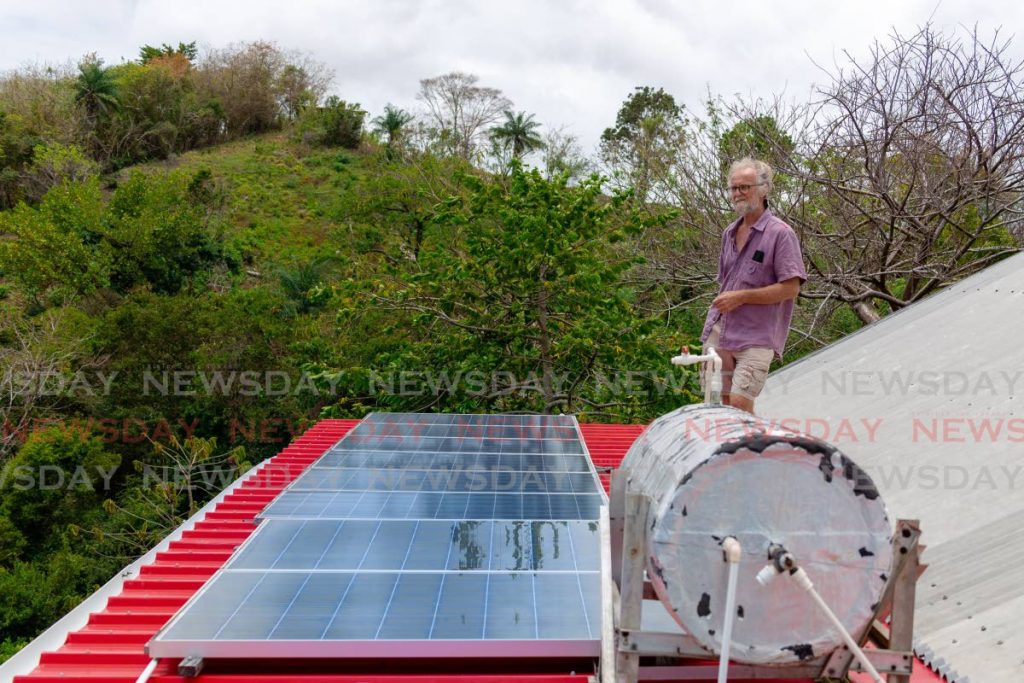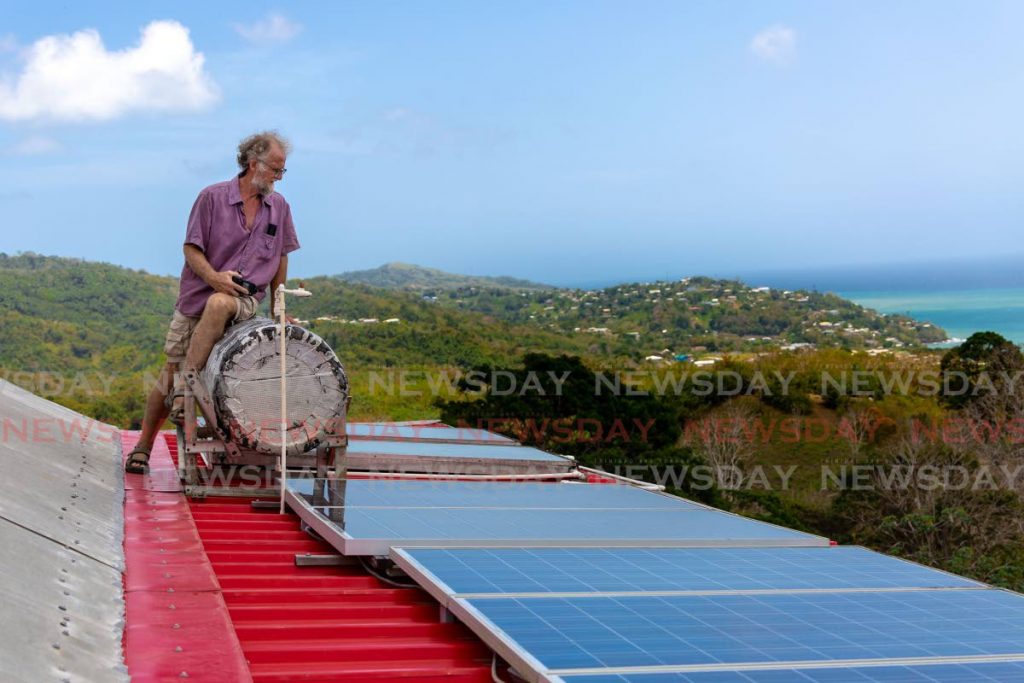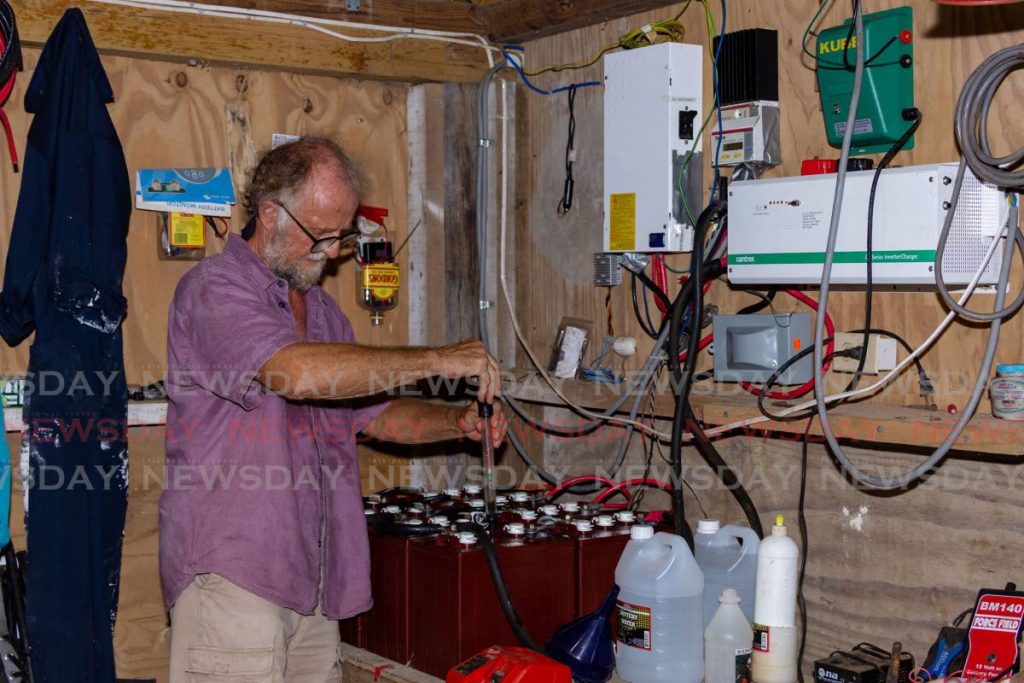Wildlife conservationist Ian Wright uses solar energy in Tobago home

Corbin Local Wildlife Park in Mason Hall, Tobago, is well known for its conservation work. Since the park’s development in 2011, it has served as a refuge to over ten species of animals, including endangered species.
But nestled in its estimated 20 acres of forestland is a lesser-known gem: a home which is 100 per cent powered by solar energy and off the grid.
Business Day recently spoke to the home’s owner, Ian Wright, about the decision to power it with solar energy.
“We should all do it (use solar power) just because the planet needs us to do it. We can’t afford to continue wasting as much energy and using as much fossil fuels as we are. We’ve got to understand here (in TT) how much energy we are wasting. It’s not something to be proud of,” said Wright.
A sculptor by profession, Wright has always had a passion for environmental work and sustainable living.
Born in England, he has lived in Ireland and throughout Africa, where he has been involved in environmental projects.
In 2002, he founded the Irish Natural Forestry Foundation (INFF), which aims to encourage Irish landowners to plant commercially and environmentally sustainable forests.
Wright moved to Tobago in 2013 after visiting the island on vacation with his wife a few years before and falling in love with it. When friend and former hunter Roy Corbin started work on Corbin Local Wildlife Park in 2011, Wright put his INFF skills to work and helped with the park’s development.
And when he moved to TT, he decided to build his dream home within the park’s sprawling forest cover.
As an advocate for sustainable living, it was a no-brainer for Wright to power his home using solar energy, as his dream home would always have maximised its reliance on natural elements.
To power the 1,200-square-foot house, Wright has eight solar panels which power two refrigerators, the lights, a few electric kettles, and toasters. The solar panels also power an electric fence surrounding the wildlife park and some small tools which are being used for maintenance work at the park.

Installing the solar panels accounted for $30,000 of the building costs.
In building a home outfitted with solar panels, Wright advised, “It’s good to have south-facing roofs for solar panels angled at approximately ten degrees to take maximum advantage of the sun.”
Apart from the installation costs, the only consistent maintenance expense Wright incurs is buying distilled water to top up the panels’ batteries every three-four weeks. He sources the water from auto shops and buys in bulk.
He admitted he has not been calculating the savings he has made from using solar energy as opposed to electrical energy from the grid. But he estimates he would have likely got a return on his investment by now, if his solar system hadn’t taken a hit from two freak accidents which resulted in additional maintenance costs.
In 2017, a gecko made its way in the system’s invertor, which resulted in some costly repairs. A few years ago, lightning struck the house which blew the system. This revealed the system
wasn't properly grounded, which led to upgrades.
He said these freak accidents are not unique and noted that electrical systems also suffer power losses from time to time.
Wright also knows the question on the mind of many is, what happens on days where there is no sunlight?
“The system here (at my home) can cope with three days and three nights with no sun, but we have had five days with no sun. So when that happens, and you start to see the number of days with no sunlight building, you cut down on your power use.
"However, I’ve never run out of power that way and we’ve always had enough lights and have been able to keep things going.”
Despite his efforts, Wright says he has received no tax incentives for his solar-power use. He thinks this is unfortunate.
“What the country has got to do is reward people. Most days I would have more solar power than I need. I should be able to feed that back into the grid.
“Now, for me, because I’m a long way from the grid, that wouldn’t work. But they need to encourage people if they decide to use solar power domestically. It should be rewarded, and that’s something that’s happening globally.”

To Wright, saying TT needs to transition to solar polar is more than a call to action: it's a warning. He believes people in TT waste electricity and it’s a practice that cannot continue.
“I’ve spent a lot of time in Africa, but I’ve never seen so many air conditioning units (as in TT).
“Not everyone (in TT) has their roof fitted to the walls, their windows are not double-glazed, but everyone still has their air conditioning on,” said Wright as he shared an example of energy waste he regularly sees in TT.
With TT’s electricity being powered by its oil and natural gas resources, Wright cautioned that these resources are non-renewable. So excessive and often wasteful energy consumption is not sustainable. Now, Wright said, it is imperative for people in TT to reduce their energy waste and transition to other forms of energy, like solar power, which is more sustainable.
And even if people aren’t able to pivot to fully solar-powered homes just yet, there are simple steps they can start with, such as using solar water heaters.
“I think by law, every new build in TT should have to put solar hot water in. It’s so foolproof and to waste all this electric energy, that we have generated using oil, to get hot water is crazy.
“We all know if you leave water out in the sunshine, or if it’s running through a black pipe, the water will be so hot you can’t touch it.
“I have a solar hot-water system on my roof and, again, I got that eight years ago. I paid $200 and it’s been working ever since.”
With TT’s electricity rates among the lowest in the world, Wright said an increase isn’t necessarily a bad thing. It could encourage people to stop wasting energy and also show that such cheap electricity rates, operating on fossil fuels, cannot be maintained.
So he is calling on TT to start diversifying its energy grid.
“It’s actually criminal that we are not using solar power more here in TT. The stuff is readily available, It’s just that we have to start encouraging it and using it more.
“I know people won’t want to hear it, but it’s exciting that the electricity prices are starting to go up. The power is too cheap, which is encouraging people to waste.”


Comments
"Wildlife conservationist Ian Wright uses solar energy in Tobago home"